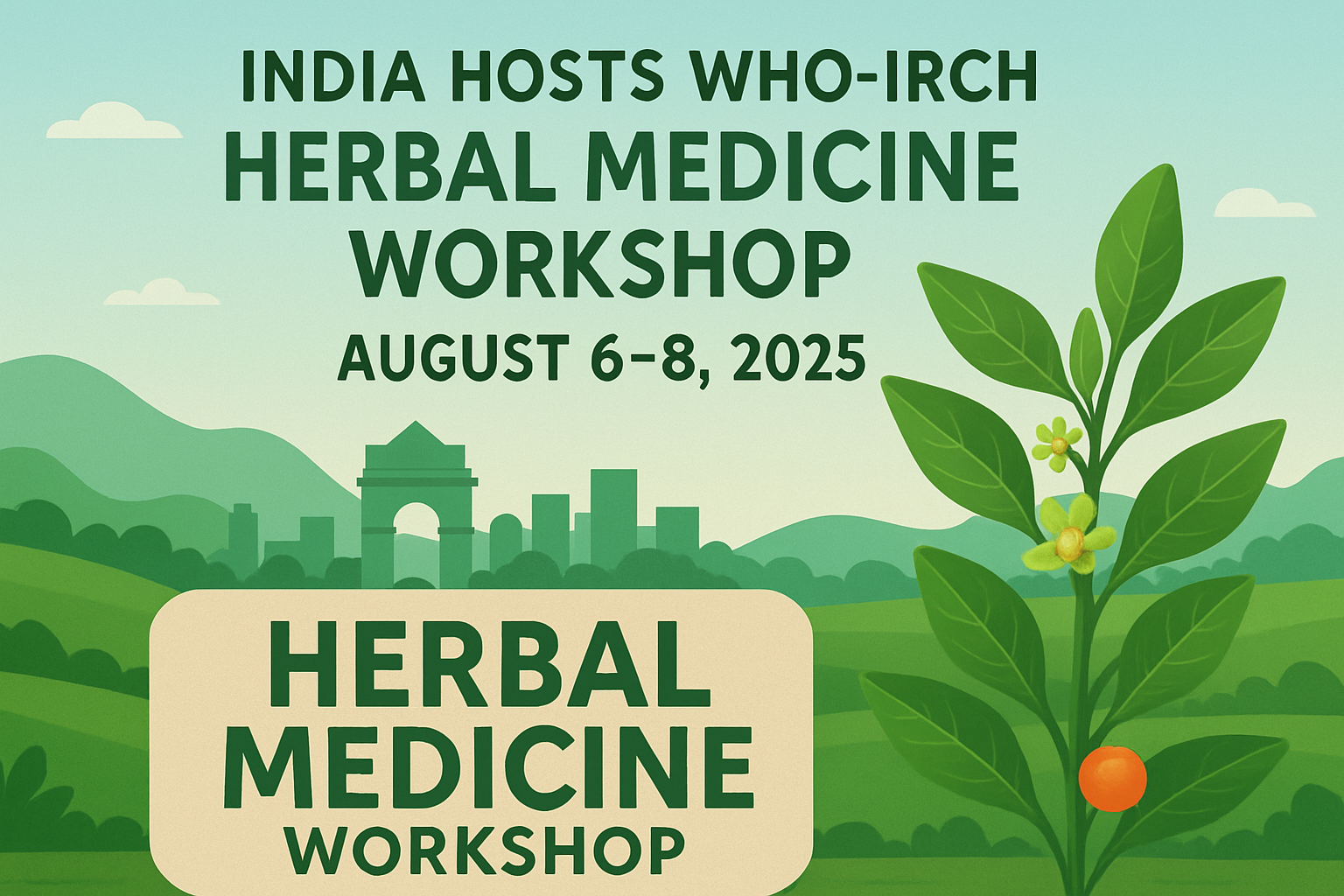India Hosts WHO IRCH Herbal Medicine Workshop to promote global collaboration, enhance safety standards, and strengthen regulation of traditional medicines.
India is set to become the epicenter of global herbal medicine regulation from August 6 to 8, 2025, as it hosts the prestigious WHO–IRCH workshop at Hotel Fortune District Centre, Ghaziabad. This three-day international event, organized by the Ministry of AYUSH in collaboration with the World Health Organization (WHO) and the Pharmacopoeia Commission for Indian Medicine & Homoeopathy (PCIM&H), marks a significant stride in the regulation and global harmonization of herbal medicine practices.
What is WHO–IRCH?
The International Regulatory Cooperation for Herbal Medicines (IRCH) is an initiative by the World Health Organization that brings together countries to collaborate on the safety, quality, and regulation of herbal products. With rising global interest in traditional and alternative medicine, such regulatory frameworks are crucial for public safety and international trade.
Countries Participating in the Workshop
The event will witness participation from over 15 countries. In-person delegates will come from:
Bhutan, Brunei, Cuba, Ghana, Indonesia, Japan, Nepal, Paraguay, Poland, Sri Lanka, Uganda, and Zimbabwe, while Brazil, Egypt, and the United States will join virtually.
The workshop will be inaugurated by Vaidya Rajesh Kotecha, Secretary of the Ministry of AYUSH, and Dr. Kim Sungchol, Chairperson of WHO-IRCH.
Key Objectives of the Workshop
The workshop is strategically designed to achieve the following five global goals:
- Strengthening international cooperation in herbal medicine regulation
- Enhancing safety and efficacy mechanisms
- Promoting regulatory convergence
- Building capacity among regulators and researchers
- Mainstreaming traditional medicine in public health systems
Core Highlights and Technical Sessions
This high-level workshop will offer a blend of technical insights, practical training, and collaborative discussions, including:
- Review of WHO-IRCH Workgroups 1 and 3, focusing on the safety, efficacy, and intended use of herbal medicines
- Sessions on preclinical research, regulatory frameworks, and safety case studies
- A special focus on Ashwagandha (Withania somnifera), a vital herb in Ayurveda, and its global regulatory status
Participants will engage in hands-on training at PCIM&H laboratories using High-Performance Thin-Layer Chromatography (HPTLC) for:
- Herbal drug identification
- Heavy metal analysis
- Chemo-profiling
Launching AYUSH Pharmacovigilance Program
A major milestone of the event will be the launch of the AYUSH Pharmacovigilance Program, aimed at systematically monitoring the safety of traditional medicines. This program seeks to instill greater confidence among users and regulators by documenting adverse events and creating a robust safety surveillance system.
Institutional Visits for Deeper Understanding
To offer a comprehensive view of India’s integrated healthcare ecosystem, international participants will visit:
- PCIM&H laboratories
- National Institute of Unani Medicine (NIUM), Ghaziabad
- All India Institute of Ayurveda (AIIA), New Delhi
These visits will showcase India’s efforts in combining traditional wisdom with modern scientific validation.
Why This Workshop Matters
With traditional medicines playing a growing role in healthcare systems worldwide, regulatory harmonization is more important than ever. This WHO-IRCH workshop provides a global platform for:
- Sharing best practices
- Establishing common standards
- Encouraging safe integration of traditional medicine into national health frameworks
India’s role as the host country reinforces its leadership in the promotion, research, and regulation of AYUSH systems on the global stage.
As global demand for herbal medicine rises, so does the responsibility to ensure safety, efficacy, and regulatory clarity. India’s hosting of the WHO-IRCH workshop in August 2025 is not just an event—it is a significant movement toward placing traditional knowledge on a scientifically sound global pedestal. With representatives from multiple continents converging in Ghaziabad, this workshop will act as a catalyst for international partnerships and pave the way for a safe, regulated, and evidence-backed future for herbal medicine.
Read Also :-
Global Plastic Profiles 2025: The $28 Billion Industry You Never Noticed
Bird Deaths and Wind Energy in India: A Silent Crisis in Clean Power

